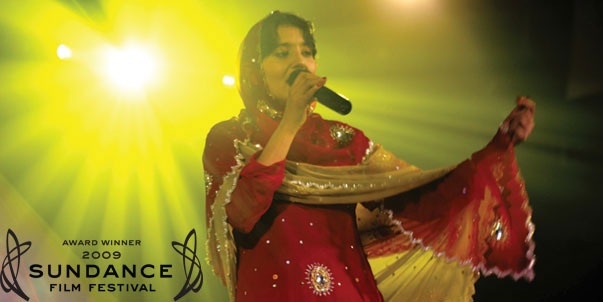Afghanistan | Mass Media versus Islamic Tradition
By Troy Jeffrey Allen
Early in Afghan Star, a young Pashtun boy briskly observes (despite missing an eye) that “If there were no songs…the world would be silent.” It is moments like these, little snippets of what happens when art influences life, that allow you to appreciate Afghan Star, despite its’ lack of delivery.
The documentary takes place in present day Afghanistan and while civil unrest and Taliban rule are not far behind, pop culture has returned to the populace—specifically, in the form of an ongoing television show called Afghan Star. The show follows the American Idol-model, pitting vocalist (and the unabashed) in a weekly sing-off. The program is a hit across the country, as it momentarily blurs lines of self-segregation, renovates the zeitgeist, and takes advantage of more modern forms of telecommunications (you have to cast your vote for each contestant via cell phone).
But what happens when mass media begins to clash with Islamic tradition? It’s a question that Setara Hussainzada, a contestant from Herat, has to answer. Outspoken and determined to become a household name, Setara is quick to shed her burqa, expose her hair and dance on stage for the cameras. Her actions, meant to inspire individualism, encourage only death threats and public disapproval from religious scholars and fellow competitors (specifically, Lema Sehar, who quietly uses her ties to the Taliban to advance as a finalist).
It’s Setara’s real-life drama that proves to be the most interesting aspect of Afghan Star. Unfortunately, it’s presented as more of an aside than a personal crisis.
Director Havanah Marking sought out to disprove media stereotypes of Afghanistan while making this documentary. She has done that successfully but shows hesitance when pointing the camera on her subjects. Outside of Setara, none of the other contestants seem to have much of a back-story. Rafi Naabzada is just a pretty boy that can kind of sing, Lema Sehar is the obdurate bitch, and Hammeed Sakhizada is…just there.
Marking seems to think that having a camera in the room is enough to pull you into her documentary, but maybe she should have taken a queue from the same media she dejects and delved deeper for drama (Then again, maybe that is a cultural contrast).
While the director does address the unavoidable issues of inequality, generational discord, American stereotypes, and democratic voting in a non-democratic country, there is a much larger over-arching idea at the heart of Afghan Star’s success that she seems to gloss over. When even in the face of guerilla warfare, foreign invaders, and civil war, music (and other art forms) can certainly overcome —when does it go too far? When does pop culture stop becoming art and start to feel like corruption? It’s a question not lost on the Afghan Star documentary, but, like competitor Lema Sehar, the film feels more concerned with facts than ideology.

